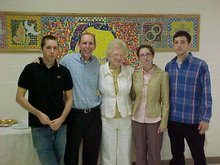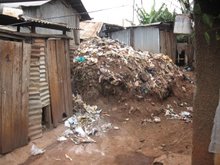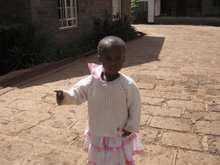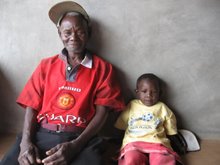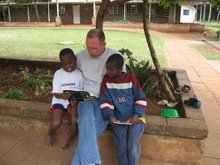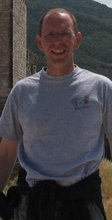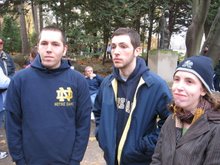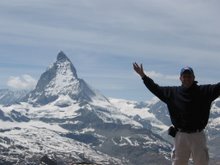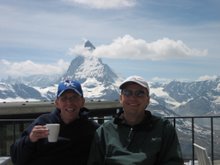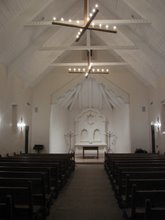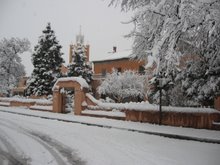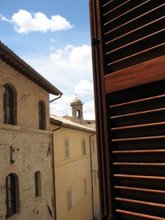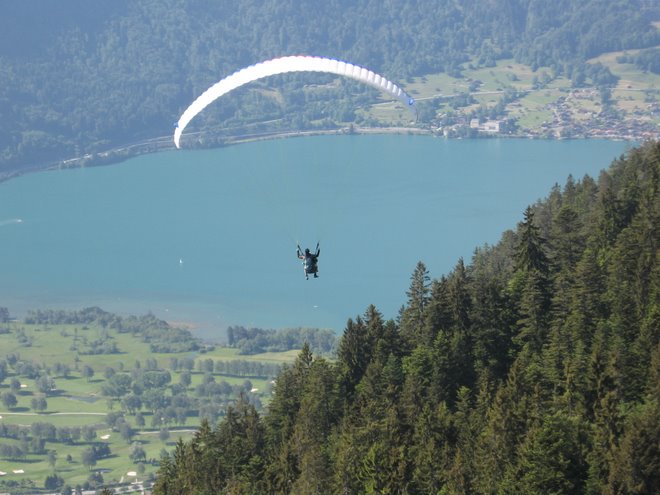Saturday, March 28, 2009
Weekend
Tomorrow, George is coming to pick me up after church. We’ll spend the afternoon in Kitengela, catching up on things. I called the village in Kitui to ask permission to visit the kids when they are on school break. I’ll probably go next weekend some time. I keep getting “flashed” in the wee hours of the night. Flashing is when someone calls you, lets it ring once and hangs up because they have no money on their phone – no airtime. So they flash you expecting you to call them back on your dime. I am sure it was some of the Village boys who heard I was in town. I didn’t call back. It was too late to start that stuff!
Next Wednesday Mwololo and I should head to Tanzania to visit another program similar to ours. They too are working with the Masai in early childhood and HIV/AIDS awareness. I am not sure where we are going, only that it is across the border. We are also putting together questions to form a baseline survey or assessment of needs at the two locations Kangundo and Kijiado. Mwololo and one Masai will go to each place and begin asking questions and compile some data for possible future programming there. That will probably take place Thursday and Friday. Things are happening quickly but we want to get things going while I am still in Kenya. Once we have a baseline, then we can see if there is a need and any way to find money to do the additional programming.
Thursday, March 26, 2009
We awaken . . .
As Christ awakens our bodies
There I look down and my poor hand is Christ.
He enters my foot and is infinitely me.
I move my hand and wonderfully
My hand becomes Christ,
Becomes all of Him.
I move my foot and at once
He appears in a flash of lightning.
Do my words seem blasphemous to you?
Then - open your heart to Him
And let yourself receive the one
Who is opening to you so deeply.
For if we genuinely love Him
We wake up inside Christ’s body
Where all our body all over,
Every most hidden part of it,
Is realized in joy as Him,
And He makes us utterly real.
And everything that is hurt, everything
That seemed to us dark, harsh, shameful,
Maimed, ugly, irreparably damaged
Is in Him transformed.
And in Him, recognized as whole, as lovely,
And radiant in His light,
We awaken as the beloved
In every last part of our body.”
Saint Symeon
The words are consoling and humbling. I read it quite often and smile and try to be open, awake, transformed. I try to be His new creation and allow His love to enter me.
Wednesday, March 25, 2009
PROJECT UPDATE


The 10:00 a.m. porridge at the Early Childhood Center is always enriched and usually a meal in itself. It is enriched with such cereal flour as maize, millet, finger millet, sorghum, soya, green grams, groundnuts, pumpkin seeds and powdered milk.
In one day, the cook uses 1.5 kg if the total number of children present is between 40-45. Sometimes the number shoots to over 50 children and the cook uses 2kg of the mix for porridge preparation. This means that between 8-10kg is used within a week. Though the prices of flour change, the following are average prices.
Maize Flour 210
Millet 195
Finger Millet 235
Sorghum 215
Soya 275
Green grams 235
Ground nuts 315
Pumpkin seeds 600
Milk 580
TOTAL SHILLINGS 2860
X4
MONTHLY 11,440 or $143.00 per month
Sometimes the Director sympathizes with the drought situation and purchases sugar to sweeten the porridge, though not always.
Submitted by Mwololo Kilonzo, Project Director
Note from Ed: Milk and water for the porridge is brought from the Masai houses. Today we witnessed the water being boiled first. The milk is boiled separately at the houses of the children. This precaution is due to a cholera outbreak in Athi River.
I put together a handbook for the teachers with information on the national curriculum and syllabus. It is difficult to understand and often more complicated than it needs to be. Objectives, themes, activities will all be discussed at a meeting tomorrow afternoon. The preschool teachers are not yet trained. That comes soon now, after a probationary period. So as far as training, MWEP is sponsoring training for the Preschool teacher, a young Masai man going to school in social work and an adult education class of maasai of 17. Here is what is going on in other parts of the project, some needs and goals:
Masai projects on site here that need continued or new funding
1.) Continuation of providing school fees, uniforms, books to Masai children. Students attend school off-site. (These are not children attending our Early Childhood Center but who attend 9 local schools.) Their fees are due three times a year and we provide uniforms for 176 students, school fees for 63 students and textbooks for 55 students. These are the most needy of the Masai.
2.) School Feeding Program for approximately 50 preschool students at the Esarunoto (Refuge) Early Childhood Education Center – a Preschool which we have begun and staff with two teachers and a cook. We purchase a healthy porridge mixture and it is prepared for the children by 10 a.m. each day. For some, it is their only meal and a reason to come to school.
3.) Medical Van Visits – This would be a new venture. A medical van and two nurses would visit the manyatta at least once a month, preferably twice a month. The cost is for the van, transport and two nurses from Athi River town.
4.) Adult Education Classes – We did a pilot program for four weeks – three days per week and attracted 17 adults. More adults would be available but because of the extreme drought, many adults are gone with the herds to find green pasture. Costs are for a retired teacher and her transport here – three days per week. The classes would run an additional 5 months with an exam following the course. Classes provide instruction for learning English, Swahili, agriculture and Mathematics.
5.) Youth Activity Days – when school is not in session, we provide organized activities that are fun but also teach about important topics such as HIV/AIDS.
6.) Preschool Uniforms – At first glance I didn’t see need for preschool uniforms but after seeing the lack of clothes in general, the uniforms for our Esarunoto Preschool students will be necessary.
7.) Self Help Activities – Not yet initiated but we need to find sources of revenue from beadwork to help make our initiative sustainable. We would provide start-up materials for beadwork and find venues at which to sell the work.
8.) Purchase water for holding tanks - The school needs water for the feeding program (nutrient filled porridge daily). The best option for us is purchasing two large plastic tanks and having fresh water trucked in monthly. The tanks would be secured at the school.
There are also additional needs such as teacher training, HIV/AIDS sessions for youth and women, personnel costs, and emergency food relief (which cost us almost $4,000 due to the continued drought).
We have also looked at two sites for additional projects – although these are in the initial stages of study. Let me tell you about what we know so far about these two possibilities.
Kangundo – a town about 90 minutes from Nairobi. The area is remote, dry, and predominately Kamba tribe. There is no electricity or decent water. A piece of land with a house on it has been offered to the Program Director for use as a Children’s Home. There is also some land adjacent to be farmed – if it would rain! The needs discussed are two: 1.) A place for Masai children from here at Athi River (that we see daily), ages infant – ten years, who are not being cared for by parents or have no parent. There has been discussion by these parents that they cannot provide for these children and therefore, the children suffer. The house would need to be furnished, food provided, social workers to staff, an educational outlet sought - off site or create something there. 2.) There are also homeless children living on the streets in the nearby town of Tala. These children have either lost their parents or have been abandoned. The tribal affiliation would be Kamba. The specific numbers and needs are not yet known.
Kajiado – a town about two hours from Athi River. Kajiado is the ancestral home of many of the Masai we work with here in Athi River. It has not rained there since last March. It is a dry and barren land. Hence the Masai moved on to Athi, River hoping for better grazing. No luck. Anyway, we traveled to Kajiado with a Masai man who has land there that he would like us to use for programming or for needy children in that area. Perhaps an early childhood center, a feeding program etc. similar to what we have in Athi. We are unsure of numbers and needs until some assessment is completed.
So, that is what’s up in Athi River and other places about now! I go to Nairobi tomorrow to print and copy some materials and make some purchases. I also need to do some food shopping. I think I am paying about $15 per week for food and water. Not too bad
Poverty
Friday, March 20, 2009
Friday in Kijiado


Thursday, March 19, 2009
Kangundo, Kijiado and Cholera – oh my.


Mwololo and I took a long trip to Kangundo. I wish I could tell you where it was but I was so turned around I couldn’t tell where I was. I thought we were going west from downtown Nairobi but Mwololo thought toward Machakos. I don’t think he is right. Anyway, it took hours. The lands are dry and reminded me of Kitui and areas around Nyumbani Village. The tribes there are mostly Kamba but there is probably a mix. A man whom Mwololo has worked with before has told us we can have the house and the land for a children’s home but we don’t exactly know what that means – for how long? What is the catch? Anyway, a meeting is scheduled with the man who lives in Machakos. He owns 100 acres. His brother and uncle live in small houses on the property as well. There is a chicken operation close by, owned by the Japanese. The area is poor and near the town of Tala. You get off the matatu before entering Kangundo and walk about 4 kilometers to the property. There is nothing there but some little kiosks. In the town of Tala there are street kids, abandoned, living homeless on the streets. Either their parents are dead or they have left the children to fend for themselves. Hence our interest. The house could also be a place for some of our Masai kids who are not being cared for in the manyatta in Athi. I think the house could handle about 6 kids. Mwololo thinks 50. The house itself isn’t too bad. A few bedrooms, cook shed outside, latrine. There is no electricity in area and no good water. I noticed where the power lines stopped. We would need a borehole and the water would be undrinkable for me. We have a lot of talking to do. And it is worth the talking but I am not sure we can do this. What we would do on the land depends on whether there is a decent school nearby. If not, we go into the preschool business. If we could get water, the soil is fertile. Our age group for the kids would probably be babies to ten years. I have no idea what to think but we will just keep an open mind and see what comes. There are so many questions.
Tomorrow we go to Kijiado with a Masai man who wants us to consider doing some work there. Kajado is the ancestral home of the Masai we are working with in Athi River. I hear it is a long journey (much longer than today) and we leave again tomorrow at dawn. I am so tired.
And . . . it made the news on the radio this morning. There are confirmed cases of cholera in Athi River – my home sweet home. I’ll just be careful to only eat the food I prepare. All else goes well. I’ll see Benjamin, the ex-seminarian this weekend and see what news he might have about his job prospects.
Wednesday, March 18, 2009
Athi
By 11:00 I was needing to do something so I washed what few clothes were dirty and hung them on the line to dry. Two peanut butter sandwiches for lunch and I took a nap. I checked my email! I purchased a modem from Safaricom, the local phone provider. I can cen the Internet now on a cell signal through a USB port on my laptop. The modem was on sale for half the price, about $73 USD. It will save going into town for Internet and paying for airtime. You still have to prepay minutes but it will be worth it. I fear I am doing something wrong though. I seem to be using MBs quickly, more quickly than lead to believe by friends who have the same modem. I can leave the modem behind for Mwololo when I come back to the states. It is slow but reliable. Back at the Village, I can remember taking a motorbike down to the main road, taking a matatu from there 30 minutes to Kitui, only to find out the entire town is without power and therefore no Internet. What a waste. So maybe I can check mail in the morning and evening and not pay too much. I was hoping to use Skype or a webcam but I don’t think it can handle it. We shall see.
Here is a quote I have come to like and will continue to meditate upon:
“What is this awesome mystery
that is taking place within me?
I can find no words to express it;
my poor hand is unable to capture it
in describing the praise and glory that belong
to the one who is above all praise,
and who transcends every word . . .
My intellect sees what has happened,
but it cannot explain it.
It can see, and wishes to explain,
but can find no word that will suffice;
for what it sees is invisible and entirely formless,
simple, completely uncompounded,
unbounded in its awesome greatness.
What I have seen is the totality recapitulated as one,
received not in essence but by participation.
Just as if you lit a flame from a flame,
it is the whole flame you receive.”
St. Symeon the New Theologian (949-1022)
But wait, there’s more . . . . but not yet. Read it again and some day later, I’ll share the rest.
Tomorrow Mwololo and I head for another part of the district to see a house he has been given access to. He wants to create a children’s home for those who are not getting the care needed by the Masai – the poorest of the poor Masai. He still insists that the mothers are all for this and desire it very much. I have doubts. I should know more after Thursday and hopefully can get some pictures. The area into which we are traveling is predominately Kamba.
Made some spaghetti noodles for dinner – with butter and tomatoes. I think that is enough for today. I also had an egg sandwich earlier. When there is not much to do, I eat when there is food in the place.
Tuesday, March 17, 2009
Reflecting


I went to Kenya in September 2007, searching for God in the faces of the poor. What I am now seeing is that as I am also discovering myself. As I know myself, I seem to know, little by little, the face of the creator as well. To be created in the image and likeness of God is quite difficult to accept. It is much easier to see a spark of the Divine in others, in my family and friends, those with whom I work and serve every day. It is easy to see God in my children, in the teachers at school in Chris. To see God in them is quite easy, I think. It is more difficult for us to see ourselves as having DNA that is Divine. As I learned last trip, I don’t need to travel far to find God. A trip across the globe is not a necessary prerequisite for being able to know or experience God. God is not “out there.” God is within and knows me better than I know myself. And that is my salvation. He knows why I do the things I do. He knows the motivations and the ego involved in everything I try to do. That is quite a relief. I just need to stay out of the way. God is in the "now"- in the present and not only "to come." In fact, if He is not here, right now, I am doubting if He is. I have the luxury of time to spend with God. I have time to Be, to pray, to laugh and relax.
My place is too nice for me. In the Village at Kitui, I struggled with finding water, finding power to charge my phone, light to see in the middle of the night, cooking on an open fire. I also had occurrences to struggle with relationships. Living in close quarters with those of other cultures and personalities was difficult at times. In Athi, at least in my house, I have water, even a cold shower. I have electric and a tile floor. I have a propane tank for cooking and I don’t need to build a fire to cook or boil water. I can take a motorbike to a grocery store. It is a much easier life. Even among the Masai, I am embarrassed to point to where I live. When they ask "where are you staying?" I have to point to the palaces on the hill. The homes are so out of place in this desert-like area. My only prerequisite for housing was that I feel secure. Maybe that was a mistake but I have to remain in this nice place now for at least three months. And maybe staying in the nice place is more of a concession for those at home who worry about me, more than I worry about myself. I am definitely secure and have Masai men guarding the place night and day. I am not sure what that means for me. I guess I have to just enjoy it, since it was chosen for me. I should just see it as a gift for this time. But . . . . I miss the Village. There was a sort of community there that I do not have here with the Masai. I remain the outsider to most, the white guy who has brought them things. I miss the playfulness of the Village. I was one of them and haven't quite found that ease in my new situation. Perhaps it will come.
Adult Classes

Returned from the Masai Adult Education class. The adult classes are held in the preschool. The fire was still hot in the cook shed, telling me that there was porridge cooked for the children today. There were six adults in attendance at the class. We had Fred (a young Masai we have hopes for as a community organizer) lead the sessions. We discussed HIV/AIDS and came up with phrases related to HIV. The phrases will be made into signs when I get into NRB tomorrow. I’ll print them from the Internet café and we will post them so that all who enter the classrooms will see them, even the churchgoers, since church is in the classroom too. The phrases were translated from English to Kimaasai. Some examples:
AIDS IS KILLING US. KEEISHO BITTIA
AIDS IS FATAL. EITORROMO BIITIA
AIDS HAS NO CURE. MEETA BITTIA OLCHANI
AIDS & DEATH ARE BROTHERS. ILALASHARA BIITIA OKEEYA
KEEP OFF AIDS & IT WILL KEEP OFF YOU. TANYA BIITIA NEKIANY SII NINYE.
DON’T TOUCH HUMAN BLOOD. MIMBUNG OSARGE LENKAE KERAI.
YES TO PIERCING, NO TO SHARING THORNS. ENTUUD ENKLYIA, KAKE MENGARE ELKIKU.
SHARING? ONE RAZOR, ONE HEAD. TABARNIE EYEMPE NABO ELUNKUNYA NABO.
AIDS IS DEATH. KEEYA BIITIA
NO TO AIDS, YES TO LIFE. MAYIOI BIITIA, KAYIU BIOTIISHO.
Interesting the words they use to describe AIDS. I like the “No sharing thorns.” Piercing is big among the Masai, especially the older ones. They use a thorn to pierce and often a knife to enlarge the piercing.

At the same time we were having our little AIDS class, another Adult Education class was going on, teaching English. We hired a retired teacher to come in and do the class. MWEP pays for the teacher and her transport. I am proud of what we have done. Baby steps, but steps nonetheless. Tomorrow it is back to NROB. I have to print the “posters” and an agreement that I typed for on of the students.

My “landlady” sent a want ad to my friend Benson, the ex seminarian. The job is with The World Council of Churches and the United Nations Refugee Office documenting Somali refugees in Northern Kenya. He is excited about the possibility of the work and can certainly handle the task. He has done that type of work before. I hope he gets it. Then I can visit the north!
Sunday Morning at Temple
Today is Sunday, March15 another day with no formal church services. Fred and Francis were to pick me up to take me to the Masai church but after an hour waiting for them, I figured they weren’t coming. Fred text messaged me that there was a problem and Francis could not get me with his bike. Maybe next week. There is also the Athi River Catholic church I would like to visit sometime, since that is my tradition! Instead I took a long walk around the Masai houses, causing quite a stir. Children yelled, women came up to me and everyone looked. I was quite a sight and quite white in my t-shirt and shorts. I didn’t stay out long, not wanting to upset anyone, especially any men wondering who this white guy thought he was, causing such a disturbance. But it is fun to see the kids. They often call me “father” and run to present their head to me to be touched. It’s a nice greeting. When I got home, I did some laundry, which always takes a while and cleaned the room pretty good. I cooked some rice with a tomato/onion sauce and some spice mix. Earlier I had fried two eggs and made a sandwich, hoping to keep on some weight this time. I am rereading Richard Rohr’s book “Things Hidden: Scripture as Spirituality”. I find myself rereading parts over and over, especially the parts that I like. Some Hindus told Richard regarding the Temple:
“You come here not to gaze at God, but to let God gaze at you.”
And so I have spent my day in my own Temple, offering myself to God, letting Him gaze at me. It was a good day and tonight I’ll call home and say hello to mom and Rachel.
This trip to Kenya is different from the others. At the Village I was constantly busy, working, relating, tutoring and worrying about the other volunteers and staff. There was always some drama going on, either caused by me or by others. Here, there is a relaxed atmosphere and a solitude I didn’t have in the Village. Here at Athi, I see myself as the funding agent for these projects and my time here is to see, first hand, what the needs are and making sure the money is being used correctly. It is not as hands-on as in the Village and the interactions are not the same or as enjoyable with the kids. I’ll always love the Village for that. Those relationships may come in time but now, things are more reserved, distant and the women and the men who remain here are probably cautious of me and what I am doing here, although they seem to know me and know that what I bring and what I represent is a good thing. Maybe this time of peace and quiet and not a lot of activity is for me. Maybe it is why I came to Kenya this time, to process things, to be alone, and be quiet. I longed for some of that in the states and perhaps I am given that time now, to write and reflect and just be.
To NRB
Today is Saturday, March 14. I got a motorbike to take me to the junction and then I went into Nairobi to FedEx some DVDs to the Rotary and school. It’s not cheap to FedEx CDs – 3680ksh or about $45.00! After mailing the DVDs I headed to Karen to get a haircut from my Kamba barber/friend and meet some friends at Nyumbani Children’s Home. It was good to see Pascal, Sr. Julie and some others. Finishing there I met Benson downtown for a meal and headed back to Athi River. The matatu driver took a short cut that I believed was blocked by the police so we had to avoid the roadblock by continuing through fields and places vehicles should never have traveled. When we got back on the main road, it was past my familiar stop. When I finally got out of the matatu, I looked for a motorbike to take me home. The cast of bike characters was strange and unfamiliar. One man wanted 200 shillings to take me home. I told him to forget it. I’d sooner walk than be cheated. The ride should cost only 50 shillings. It’s not the amount as much as people trying to squeeze money from mazungus. Just as I was arguing, a large man with a sock cap came up from behind me and put his hand in my pocket. Laughing, it was Patrick, a motorbike driver whom I had stopped calling for rides because I felt he overcharged me. He said he’d take me home for free. I took the ride, relieved to see a familiar face.
Porridge

On Friday we went to the preschool and found that no porridge was being made. So, Mwololo and I, with the help of the two teachers got a fire going, cooked some uji and served it to about 40 kids. There is to be a meeting on Saturday to find out why the Masai are not consistent in making the porridge for the students.
Thursday, March 12, 2009
More News
Today is Tuesday March 10, 2009. This morning I caught motorbike ride to
After we purchased the things we needed, we headed for food but on our way, there were signs of a problem ahead. Hundreds of people gathered – having caught a thief. Once it was known there were thieves in the area, metal doors started slamming shut and stores closed. We took off in another direction and headed for restaurant and good water! I got a burger. They were out of cheese.
This was also a day of protest at the University of Nairobi, near where we were shopping downtown. It was to be peaceful protests but Mwololo says they never are. Listen to this. The students were protesting one of their own students being killed by the police. He was a young man in his third year. But he was also a Director of a group formed to fight against police torture. The police killed him! Now the organization he headed is being closed down because the group has been falsely rumored (by the police) to be funded by the Mungiki. Who knows – but the violence doesn’t stop, even perpetuated by the police and Kenyan government, in the capital city. These are issues and problems I never dealt with in the remote village of Kitui.
So I am back home now, looking over the books we bought, knowing it is too much for the “teachers” at the Child Center. They need help and training. It will come.
I am still trying to give up something for Lent. I used to give up sarcasm at school. Everyone knew it and it lasted for about 3 hours. I am a sarcastic person. Sometimes the folks in Kenya don’t get me. Too bad, I am hilarious. I am told that sarcasm is the lowest form of humor. So Lent – a time of atonement, repentance, preparation. It’s my call to continue to give my life away, in Kenya and really anywhere. A call to give it away and trust that God will replenish me, raise me up, sustain me. God has certainly chosen this place for me. If my desire is to give it all away, Kenya definitely is the place. Everyone wants a piece of you. When I look at the people I have met here, I become so grateful. They struggle so much, day to day. Everyone I meet is looking for a job it seems. Many at the Village are now struggling to find work and food. In a split second they are homeless and without food. Some of these people I have written about in the past. But it is a way of life and has always been that way. Even in my slimming down of my lifestyle, I am basically secure and know I have a net to catch me – friends and family. With my Kenyan brothers and sisters, their families and family are in worse shape than they are. No wonder they look to old white guys for help – and it doesn’t take much to help. But there are so many. Too many. And so this Lent, I pray for them.
Wednesday March 11, 2009. Today was meant to be a free day for me, a meeting later in the afternoon with the committee of Masai overseeing the preschool feeding program. The cook was also to join us. Of course in Africa, nothing works as planned. The Chairman was ready but the cook was out with the cattle. Mwololo went to meet with the chairman without me in case the meeting failed to materialize and then he was headed on to Machakos. The meeting was called because sometimes the porridge was not prepared or prepared very late. This is one of the agreements with the masai – they prepare porridge for their children – not us. We provide the food. They make it.
Mwololo stopped by for some computer lessons and to take some files home to look over and practice with. So I relaxed part of the morning and worked on a video for the Rotary. At about one o’clock, George called from Mallolongo - a town about 25 minutes from here, wondering if I could join him to meet some visitors who were interested in volunteering for the Masai program. I had told them there was no place for volunteers as yet but wanted to meet them all the same. I figured out how to call a motorbike taxi and biked to the Namanga Road junction. Then I took a matatu on some bad road to the little town to meet George and friends. We had a good meeting, again good to see my old friend and get out on my own away from the manyatta and Athi River. The visitor and her aunt gave us a donation! I am glad I went. Today I cooked oatmeal with Masai milk. I hope my stomach can tolerate it because it was very good. I strained the milk, boiled it, and added water and boiled it again before adding oats and boiling it again! Sounds like it should kill just about anything in there. I ate leftover rice from the night before and PB and J for dinner (and an orange). Not too bad. I’ll cook something more substantial tomorrow.
We wrote to a Masai program in Tanzania, requesting to visit them. We are hoping to hear from them soon and be given the ok to travel to see their preschool and HIV/AIDS program. Road Trip!
Today is Thursday, March 12, 2009. Mwololo is returning from Machakos and we get together this afternoon for a meeting and try to finalize some plans. I worked in my “home office” although there was no electricity today. We also got word, through the newspaper, that water will be rationed throughout Nairobi. That means that on some days, certain estates (neighborhoods) will be without water. There continues to be drought conditions all around, especially where I am living.
Tuesday, March 10, 2009
Some other pics

 Above are the interiors of the "Baby Class" and "Nursery Class" rooms. They look bright and colorful, but trust me, that is becasue of the flash. They are dark and there are only little cement vents, not windows. The Masai made the benches and there is canvas on the floor for the yiny ones.
Above are the interiors of the "Baby Class" and "Nursery Class" rooms. They look bright and colorful, but trust me, that is becasue of the flash. They are dark and there are only little cement vents, not windows. The Masai made the benches and there is canvas on the floor for the yiny ones.Today is Monday, my first work day at
I also learned that a small piece of property was given to the Masai by a protestant bishop to construct a church. Then the bishop said there was a requirement that the Masai need to pay to have that area fenced – not in a typical Masai fencing style – thorn bushes, but using barbed wire. Then the bishop made it known that he would be farming most of the land he was giving to the Masai and also the deal is for only two years. So . . .this means that the Bishop gets his garden fenced for free. He is a crook. Everyone wants a bribe. Everyone wants money to do a job for which they are already getting a salary, like the Chief of Athi River, the Health Department Medical Van, the school inspectors, and on and on. It seems like everyone is “on the take.” These people are so poor, hungry and it is getting worse with the food crisis, the drought, bad economy and joblessness.
After we spent time ironing out issues at the Masai Manyatta, Mwololo took me to the grocery to purchase more food. Vegetables, some fruit, more water etc. Today at five o’clock, some of the Masai delivered to me, a wooden set of shelves made in
Flies and mosquitoes are everywhere around my new place. They are many, stubborn and they annoying the heck out of me. I have to get into my netting at dark if I want to be safe from bites. There were fewer at the village. I didn’t even need a net!
I cooked by myself tonight. I found peanut butter and bread at the store that I had for late lunch but I actually cooked tonight. I boiled some potatoes, some carrots, a little onion and then added some tomatoes and a spice mix that is common around here. It tasted like a potato stew or soup. It was good. That and some water with a little orange syrup used to make flavored drinks. I am still full. I bought a bag of oatmeal-like cereal and hope to make use of the cup of Masai milk that is delivered each morning. Some oatmeal might be a good start each day – if the milk doesn’t kill me. I can boil the milk and then make oatmeal.
The Masai have invited me to their “church” this coming Sunday. Actually one of them came to pick me up this past Sunday to go to church but I couldn’t figure out why he was here or what he wanted. It is difficult to communicate and there have been many misunderstandings. The church services have been moved to the preschool “classroom”. Friends have cautioned me that the Masai will probably cook something for me. The friends said, “Be careful”. I said, “Do you mean I shouldn’t eat it?” They said, “Oh no, you have to eat it.” So I am a little confused on how to be sanitary and respectful. Stay tuned.
To the Masai Manyatta
On Thursday we did some shopping at a store in 

Two Masai young women serve as teachers. There are no learning materials but you can hear the children counting, going over the alphabet and taking all the students to the new latrine. The kids need to be taught how to use the latrine. There are no latrines in the Manyatta. They also begin teaching the children about HIV/AIDS. It is with the young that we are hoping to have some impact on HIV/AIDS reduction. The adults are resistant to discussing the subject.
We visited the mother of a young mentally challenged girl in the village who died two weeks ago in a fire in their mud and stick house. She had been left alone and tried to cook something. The fire quickly consumed the small dwelling. When the mother saw Mwololo and me today, she began weeping once again. She said that when she saw me – she remembered her daughter. I had taken video of mother and daughter a few months ago. So sad.
We saw yet another dead cow. The drought continues and cattle are dying. Interestingly, passing through the manyatta was a herd of over 60 camels! What a sight! It looked like
We paid a visit to a house built near the Masai Manyatta. The owner has agreed to allow us (the
We ran into Fred, the young Masai who will take me out for some days and nights with the herds. He remembered his promise.
Inside the Place



Today is Sunday and it is the first time I am alone in my room. Benjamin stayed for 3 nights to make sure I could handle my own cooking and housekeeping. Ben is 28 years old and says it is against his culture (He is Trukana tribe.) to see an elder working if there are young ones around. So Ben cooked, cleaned, mopped, did my laundry – all that stuff, out of respect for my old age. He is a great guy but I am looking forward to living alone and beginning my time in solitude at night. Ben, like very many in
Cooking will be my biggest struggle. The nearest store is a motorbike ride away and with no refrigerator, you need to shop often. So far, Ben and I cooked rice and tomatoes, cabbage and tomatoes, and I made pasta and tomatoes. Ben ate rice – no pasta. We also made peanut butter and jam sandwiches. I will always need to buy water since it was in this part of
Coming In From London
Nairobi. I know a pilot for BA that can leave notes for whatever aircraft crew hauls me to Nairobi. British Air and the Nairobi-bound flight crews are connected to Nyumbani Children’s Home and these British crews do volunteers work on their layovers at Nyumbani. Anyway, a note was left for the pilot and I got a great seat, food and some sleep on the way to Nairobi. I got into Nairobi at about 9:30pm, not optimal time to arrive in Kenya. Needless to say, it is dangerous after dark. I had gotten an email from Benjamin, a young friend and nowI arrived safely in Nairobi Wednesday night. After the problems leaving New York’s weather, the visit in the new Heathrow Terminal 5 went smoothly, as did the meet-ups with my sons. I enjoyed seeing the boys in London; if only for a short time. The boys got safely back to JFK and home in good time. I was grateful to be bumped up to Business Class on British Airways to ex-seminarian I had met in the village in days past. He said he was arranging to have me picked up and would escort me to a hotel that he chose. He did indeed meet me at the airport, had a safari van waiting for me and we headed for downtown Nairobi. It was close to eleven and the city was alive, at least near where the hotel was. I got inside the old downtown hotel as quickly as possible. The Diplomat Hotel had seen better days. The place was old, in need of repair, a good cleaning and some rewiring and plumbing. There were screams, screeches, chanting and such all night long from the streets four floors down. The place actually was quieter with the morning rush hour traffic. I could go on describing my fears of the place but what’s the point? It was a little scary but Ben stayed with me. It cost about $20 and included a breakfast in the greasy spoon next door.
My best Kenyan friend George called me at the hotel. He wanted to welcome me back and to warn me not to use public transportation when traveling today and avoid Kitengela, a small town near Athi River. Kitengela is actually where George lives and I have been there many times. Apparently the Mungiki, a well organized, armed, violent, extortionist gang had made threats strong enough to stop all pubic transportation in and out of Kitengela and Athi River. This group was thought to be responsible for many hundreds of murders last year during the post-election violence. If violence erupts again in Kenya, they will have something to do with it. The best comparison to the Mungiki would be the Mafia.
So the next morning, after breakfast, Ben and I hired a cab to take us to Athi River from the Diplomat Hotel. You often see a police presence in Nairobi but, at Athi River, we saw more soldiers and police to deal with the gangs of thugs who threatened to make problems this day. We met Mwololo, the MWEP (Masai Women Empowerment Project) director at a main turn-off and drove to my new home for the next three months. I’ll try to get some pics posted but you should know the place is beautiful. From a distance it looks like a condo complex from the states, glistening among the rough Athi River cement factory warehouses and dump trucks whizzing by in a cloud of white dust. These new buildings are actually attached homes, two story, well landscaped and maintained. Of the 100 or so units, only three have been occupied! I am living in the servant quarters of one of them. Apparently, houses (and even condo-types like these) are sold with a side building for the servant of the house. Half of these condos have (or will have when occupied) a servant. A Kenyan man working in the US owns the “big house” where I stay. His wife is a teacher in Nairobi (I think) and they have two young kids, Victor and Victoria. The kids are great and the mom and her housekeeper are very open and friendly. They are Kamba but speak English.
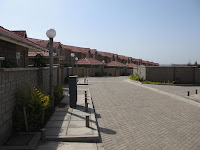
 The pics above are of the complex I am staying. I have one room in the little building in front of the apartment. Click to enlarge pics. My place is a one-room structure with a simple bathroom and running water – although it is undrinkable. It has a shower, although there is no hot water. I am use to that. I am just glad to be free from the bucket shower. The complex is walled, monitored by watchman day and night and very close to 5 of the Masai manyattas. The actual project site where I am involved is a good distance away and would take hours to walk to it. A Masai man stopped by to tell me that he would be bringing me a cup of fresh cow’s milk each morning at no charge – just to be nice to the white guy. I can boil it on my little propane tank and maybe make oatmeal or hot cereal each morning.
The pics above are of the complex I am staying. I have one room in the little building in front of the apartment. Click to enlarge pics. My place is a one-room structure with a simple bathroom and running water – although it is undrinkable. It has a shower, although there is no hot water. I am use to that. I am just glad to be free from the bucket shower. The complex is walled, monitored by watchman day and night and very close to 5 of the Masai manyattas. The actual project site where I am involved is a good distance away and would take hours to walk to it. A Masai man stopped by to tell me that he would be bringing me a cup of fresh cow’s milk each morning at no charge – just to be nice to the white guy. I can boil it on my little propane tank and maybe make oatmeal or hot cereal each morning.(Note: My friend Mwololo cautioned me about taking the milk. Boiling takes care of some things but he says the way it is milked, the containers etc. are not sanitary. So, if I complain later of stomach issues – refer to this note!)
Tuesday, March 3, 2009
London
I found an article in the Saturday NY Times about recurring violence in Kenya. Check out this link if you can. LINK HERE
Everything else goes well. I leave tomorrow morning and get to Nairobi about 10pm on the 4th of March. Then the adventure begins anew. I get that excitement back when I get close to returning to Kenya. It is difficult to explain but I am happy, smiling, confident and grateful for this experuience. There is no fear, no anxiety (now that someone is picking me at the airport!) It will all be fine and I am hoping we can do some good work for the Masai women and children. www.mwep.blogspot.com




